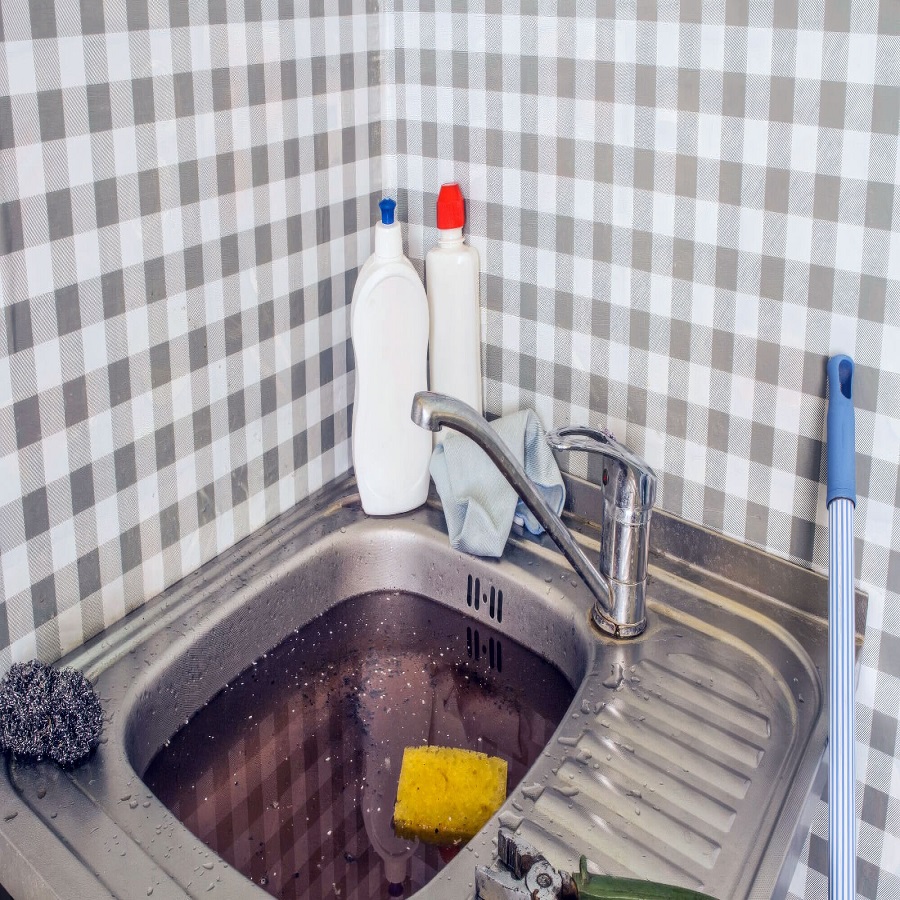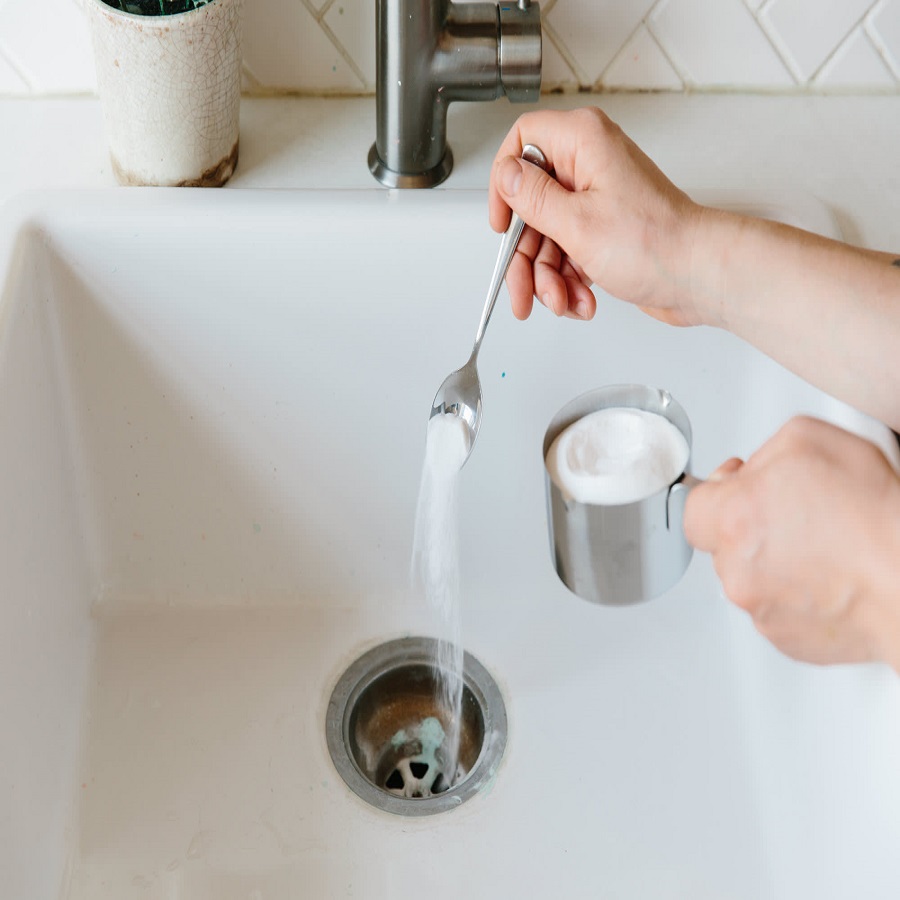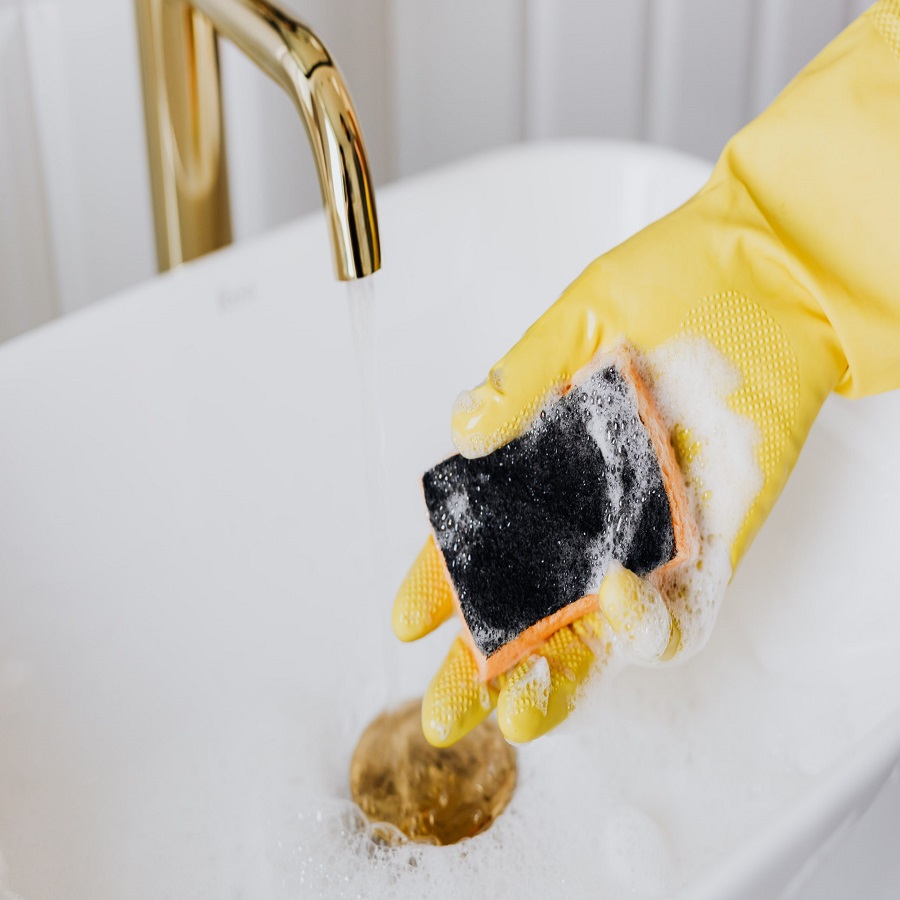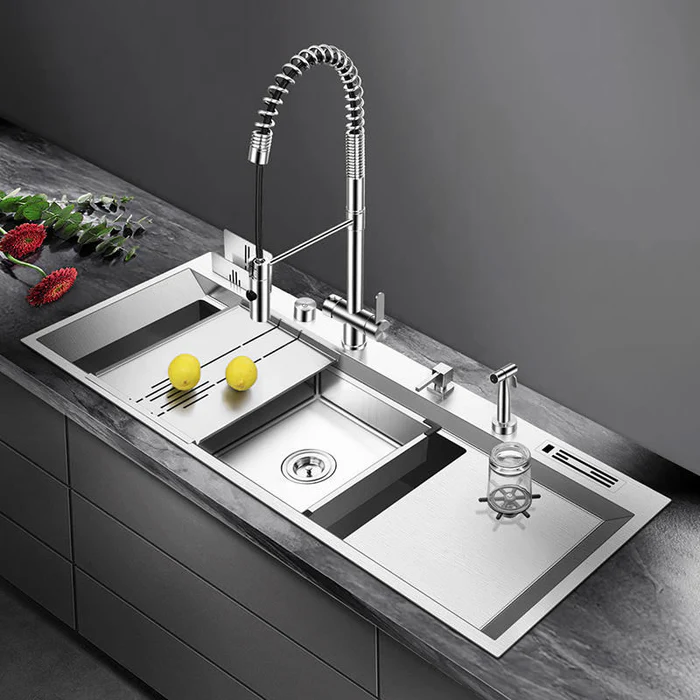Common Causes of Kitchen Sink Smells
How to get rid of kitchen sink smell – Unpleasant smells from your kitchen sink can dampen the joy of cooking. But why does your sink emit such odors? It’s important to understand the common culprits so that you can take appropriate action to eliminate them.
Food Buildup and Grease Accumulation
Leftovers and cooking oils are often the reason behind stinky sinks. Bits of food get stuck in the drain and start to decompose, emitting a foul smell. Oils and grease can coat the pipes, trapping food particles and causing a buildup that leads to unpleasant odors. To avoid this, be mindful of what goes down your drain. Dispose of oil and food scraps separately. Regular flushing with hot water can help prevent accumulation.
Issues with Pipes and U-bend
Sometimes the problem lies within the pipes or the U-bend. A clog or a leak can cause water to stagnate. This stale water becomes a breeding ground for bacteria, resulting in bad smells. If you notice your sink draining slowly or a rotten egg scent, it might indicate a U-bend issue. Ensure you check for leaks and clear out any blockages. Simple measures like running the water regularly can keep the U-bend from drying out and avoid smells from sewer gases.
Daily Practices to Prevent Sink Odors
Proper daily habits can stop unpleasant smells in the kitchen sink. Below are two important practices you can start today.
Proper Disposal of Food Waste
Ensuring food scraps don’t end up in your sink is vital. Use a kitchen waste bin to dispose of food leftovers and tea bags. Also, make use of a sink strainer to catch small particles when washing dishes. Avoid throwing oils and fat down the drain; instead, collect them in a container and throw them in the trash.
Regular Cleaning and Maintenance
Consistent cleaning helps in preventing odor build-up. Weekly, flush your drain with boiling water to dislodge clogged food particles and grease. After the water rinse, using a brush, scrub the visible parts of the sink to remove any residue. Remember to clean the U-bend periodically; unscrew it carefully, clear out any debris, and screw it back securely to prevent leaks.
Natural Remedies for Neutralizing Odors
Having a fresh-smelling kitchen is key to a pleasant home environment. When foul odors arise from your kitchen sink, natural remedies can be both safe and effective. Let’s explore two popular methods that require simple ingredients likely already in your pantry.
Baking Soda and Vinegar Method
A dynamic duo for fighting sink smells is baking soda and vinegar. Start by pouring half a cup of baking soda down the drain. Follow with a cup of white vinegar. This mix will foam and fizz, indicating the cleaning action has begun. Allow it to sit for at least 30 minutes. Then, flush it down with boiling water to clear out all the loosened debris. This method works well for routine maintenance and mild odors.
Lemon and Ice Cubes Combination
For a fresher scent, combine lemon and ice cubes. Drop chopped lemon peels and a cup of ice cubes down the disposal. Run the garbage disposal for a few seconds. The ice will sharpen the blades, and the lemon will release a clean, citrusy aroma. This method is ideal for a quick refresh and can help maintain a pleasant smell between deeper cleanings.
Chemical Solutions for Stubborn Smells
Sometimes, natural remedies may not be enough for relentless kitchen sink smells. In such cases, chemical solutions can be considered. However, it’s crucial to understand their benefits and drawbacks.
The Use of Bleach: Pros and Cons
Using bleach to tackle sink odors is a common suggestion. Bleach can kill germs and whiten surfaces, but it isn’t without risk. The advantages include its high effectiveness against bacteria and its availability. However, there are significant cons. Bleach is corrosive and can damage pipes if used frequently. It can also react with other substances and create harmful fumes. Thus, it’s often better to use bleach with caution and as a last resort.
Commercial Drain Cleaners
For stubborn smells, commercial drain cleaners can offer a powerful solution. These products are specifically formulated to dissolve the gunk that causes odors. When choosing a drain cleaner, opt for one that’s safe for your type of pipes. Follow the instructions carefully to avoid damaging your plumbing. Keep in mind, regular use of harsh chemicals can lead to pipe erosion. It’s best to try gentler methods first, and save commercial cleaners for severe cases.
 How to Clean Garbage Disposals
How to Clean Garbage Disposals
To keep your kitchen smelling fresh, cleaning the garbage disposal is key. Here’s how:
Routine Cleaning Techniques
Use these simple steps often:
- Run cold water and turn on the disposal every day.
- Drop a few ice cubes and salt down the disposal weekly.
- Grind up citrus peels for a natural scent boost.
- Flush with baking soda and vinegar monthly for deep cleaning.
Dealing with Grease and Food Particles
Here’s how to handle hard-to-clean waste:
- Avoid pouring grease down the disposal.
- Use a mixture of detergent and hot water to break down grease.
- For tough particles, use plunger techniques safely.
- For routine disposal, throw in lemon peels or ice cubes regularly.
Remember, keeping your disposal clean prevents bad smells from settling in your kitchen.
When to Call a Professional Plumber
When kitchen sink smells don’t go away with usual fixes, it’s time to call in a pro. Here’s how to know when you need expert help.
Identifying Serious Plumbing Issues
Persistent bad odors may signal deeper plumbing problems. Look out for slow-draining sinks, gurgling sounds, or water backing up. These are signs you might have serious clogs or damaged pipes that DIY methods can’t fix. If your sink smells like sewage, it could be a venting issue. Professional plumbers can diagnose and solve these complex problems.
Benefits of Professional Drain Cleaning
Hiring a plumber for drain cleaning has big perks. Pros can remove deep-set clogs, scale, and buildup. They have special tools and chemicals safe for your pipes. A deep clean by a plumber can also identify potential issues before they get worse. A professional’s touch can leave sinks smelling fresh and improve overall plumbing health.
 Innovative Cleaning Technologies
Innovative Cleaning Technologies
As we have explored natural and chemical solutions to combat kitchen sink smells, it’s time to delve into innovative cleaning technologies that can take odor control to the next level.
HOCl Fogging for Odor Control
HOCl (hypochlorous acid) fogging is a cutting-edge technique for tackling unpleasant odors, including those emanating from kitchen sinks. This process involves dispersing HOCl, a mild but powerful disinfectant, in the form of a fog. The fog’s fine mist reaches nooks and crannies, offering thorough sanitization and neutralization of odors. It’s especially useful when quick, all-over coverage is needed. HOCl is known to be safe for human contact while effectively destroying bacteria and viruses, which can directly contribute to smells.
Benefits of Ultrasonic Atomization Technology
Ultrasonic atomization is another advanced method that can help in keeping your kitchen smells fresh. This technology uses high-frequency sound waves to create fine particles of liquid. The resulting mist can contain cleaning agents that target and eliminate unseen pathogens or odorous substances. Its benefits include:
- Minimal noise during operation.
- Highly efficient distribution of cleaning agents.
- Decreased likelihood of wet, residue-prone surfaces.
- Overall improved air and surface quality.
When traditional cleaning fails to remove stubborn odors, these innovative technologies can be a powerful ally. HOCl fogging and ultrasonic atomization are not only effective but also embrace environmental consciousness by avoiding the use of harmful chemicals. Implementing these techniques can provide a lasting solution to the ongoing battle against kitchen sink smells.




